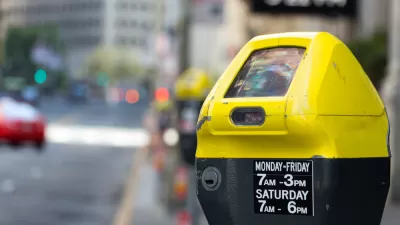The preliminary results are in for America's most ambitious experiment in demand-based parking pricing. Among the surprises: the average price at the spaces participating in San Francisco's pioneering program actually declined by 1 percent.
"SFpark, which uses 'smart meters' and ground sensors to measure parking occupancy and adjust prices accordingly, is providing valuable lessons for San Francisco and cities around the world that want to reduce the amount of time drivers spend cruising the streets for a parking space," reports Aaron Bialick.
"The growing body of data collected from the program is shedding more light on the complexities of parking demand," he adds. "But overall, [parking guru Donald] Shoup says, it’s providing hard evidence that raising and lowering meter prices is an effective way to keep enough parking spots available for drivers who need them — and to help ensure too many spots don’t sit empty."
"Shoup calls SFpark a 'political success' — insofar as it’s converted existing parking meters (adding new meters is another question) — and he says the program shows how dynamic parking pricing can be an alternative to congestion pricing that requires less infrastructure and fewer political battles."
FULL STORY: Shoup: SFpark Yields Promising Results, Lessons for Demand-Based Pricing

Maui's Vacation Rental Debate Turns Ugly
Verbal attacks, misinformation campaigns and fistfights plague a high-stakes debate to convert thousands of vacation rentals into long-term housing.

Planetizen Federal Action Tracker
A weekly monitor of how Trump’s orders and actions are impacting planners and planning in America.

In Urban Planning, AI Prompting Could be the New Design Thinking
Creativity has long been key to great urban design. What if we see AI as our new creative partner?

King County Supportive Housing Program Offers Hope for Unhoused Residents
The county is taking a ‘Housing First’ approach that prioritizes getting people into housing, then offering wraparound supportive services.

Researchers Use AI to Get Clearer Picture of US Housing
Analysts are using artificial intelligence to supercharge their research by allowing them to comb through data faster. Though these AI tools can be error prone, they save time and housing researchers are optimistic about the future.

Making Shared Micromobility More Inclusive
Cities and shared mobility system operators can do more to include people with disabilities in planning and operations, per a new report.
Urban Design for Planners 1: Software Tools
This six-course series explores essential urban design concepts using open source software and equips planners with the tools they need to participate fully in the urban design process.
Planning for Universal Design
Learn the tools for implementing Universal Design in planning regulations.
planning NEXT
Appalachian Highlands Housing Partners
Mpact (founded as Rail~Volution)
City of Camden Redevelopment Agency
City of Astoria
City of Portland
City of Laramie



























